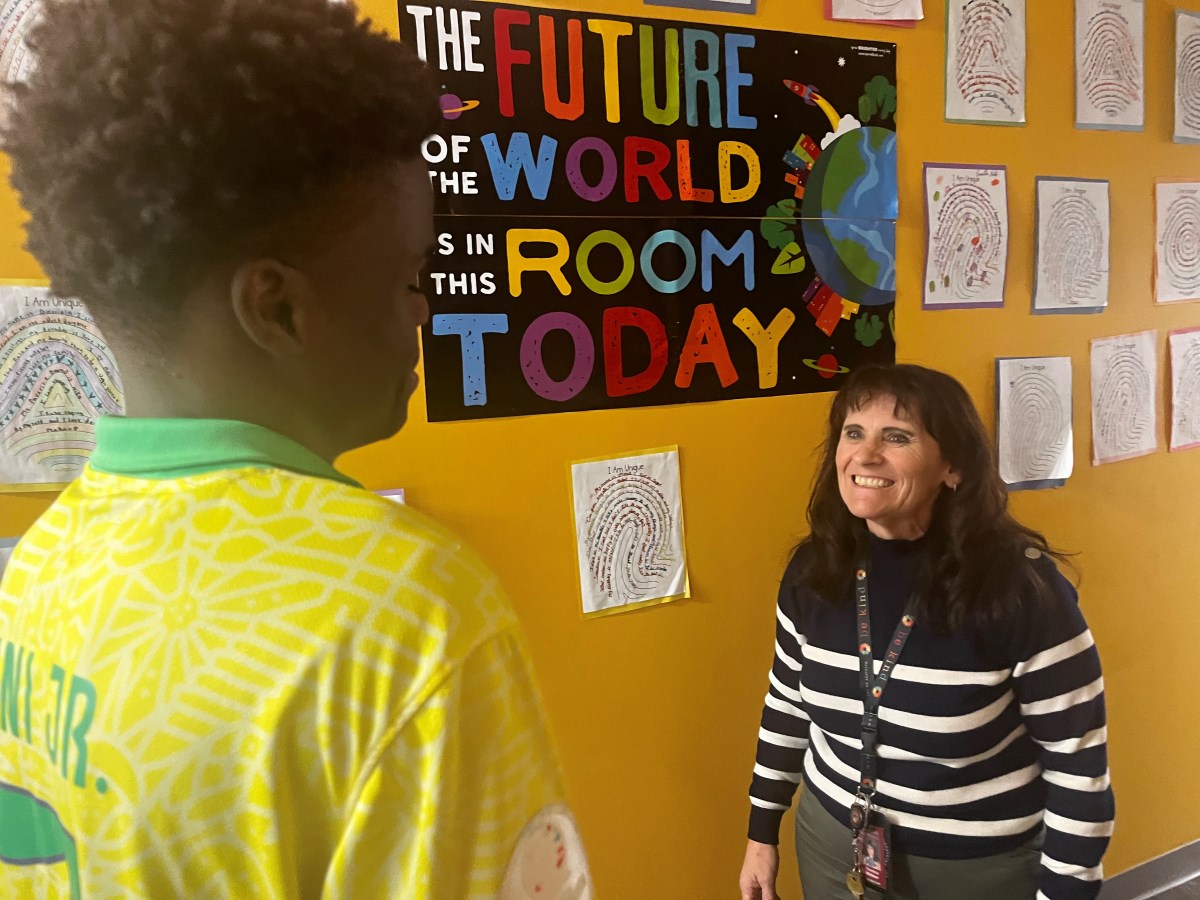Students Adapt to a Whole New Life
- January 3rd 2025
- School News

Theresa Webber, SHS multilingual teacher, engages with a student
Credit: Brett Williams
By Grace Pearson, Sanford High School senior
Adjusting to a new community or a new school is hard enough, but for some students – among the 250 asylum seekers who have come to Sanford since May 2023 – the challenges are far greater. They must get used to a new language, a new way of life, and for some, a new sense of themselves.
“When you end up living away from a place you live in your whole life, you end up kind of losing your identity. If not your whole identity, you begin to lose parts of yourself,” said Larissa Vita, a junior from Angola. “I was doing this thing of not knowing who I am, not recognizing myself, my behaviors and the things I do, the things I liked. I didn’t know if I liked it anymore.”
Vita said that her family, like other asylum seekers, left home because it was no longer safe for them. “At the end of the day,” she said, “we are just people looking for protection, a better life. We need to take some decisions that we really don’t want because of our safety.”
Students from Angola and Honduras all said that learning English has been one of the hardest parts about moving to Sanford. Most Angolans speak Portuguese, while Central Americans speak Spanish. English, one Angolan student said, “is very difficult.”
Theresa Webber, a multilingual teacher who has helped refugee students across the district, said about 15% of her students have a strong enough foundation in English to get through without relying heavily on some type of translation. Some of her students who started this year will be exiting her English class because they came with a strong foundation.
“I have other students who came with no English background and severely interrupted education,” she said. “And so, for those students, it’s not just learning the English language. It’s also trying to fill in the gaps of their education.” For those students, asking for help can be a challenge, which can lead to isolation.
Students say that some changes are welcome. “The teachers are very different here,” Vita said. For one thing, teachers here are less demanding and offer more help. “In Angola, the teachers are always reminding you of your jobs and the things you need to do … I don’t think that I will find a school like this back in my country.”
Webber’s role goes beyond teaching English. She also helps students do things like registering for sports, understanding the Regional Technical Center programs that are available to them, and helping them apply for those programs. She stays in touch with students’ families, which can be a new thing for some parents “because a lot of them come from places where families didn’t really have rights in regard to their children’s education,” she said. “We want them to be part of our academic team and have a voice in their child’s education.”
The role of teachers like Webber has grown in recent years, Webber said. “I started here in 2018, and I was the only multilingual language teacher for the entire district. So, I did all the schools. And when I started, I had 22 students.” Now, she said, there are five teachers serving about 200 students. Webber works with 50 students at the high school.
Students say they have felt welcome despite their aversion to school cafeteria food and soccer here — which they described as being better in Angola. Many other students have been helpful, doing things like showing them around the school.
One student who asked not to be named said she would like the chance to introduce American students to more of her culture. Angolans love music and dancing, she said, and many wish they could have more of their music here. “It will help us to remember that we’re in there and that we’re not going to miss them that much, like we always do,” she said.
Vita agreed. “We have lots of culture in Angola. Even within Angolans, we have different cultures that we share with each other. We are very colorful, colorful in our clothing and our traditions. Everything we do. And it’s like the people there, it’s like everyone has a promise that they will look after each other. It’s like a rule in the whole country,” she said.
Students said they are very thankful for their teacher. “Mrs. Webber is a great person, and you can see that she loves her job,” Vita said. “She did a lot of things; we learned English with her. Most of us didn’t know how to talk English when we first came here.”
“She’s been helping us a lot and I really appreciate it,” another student said. “I really appreciate all the work she’s done with me those three years. And she’s a nice teacher.”
Webber said she wants native-born students to realize what an asset the new students are to the community. “Oftentimes, people see not being fluent in English as a deficit,” she said. “And truly, in our world these days, being able to speak multiple languages is a gift. And my students can bring so much to any classroom because they have a whole host of experiences, knowledge and skills that students who have been raised just in Sanford don’t have. So I really would like people, rather than seeing my students as being at a deficit, I’d like them to really think about the richness that they can bring to our community and how they can bring so many strengths, so many skills, so much information and so many experiences that can enrich everyone’s life here at Sanford.”





